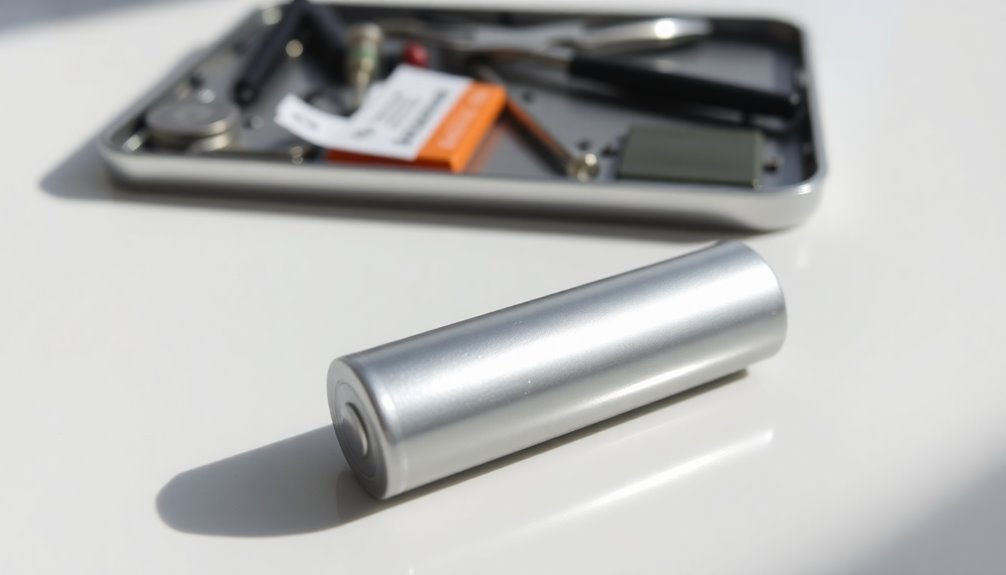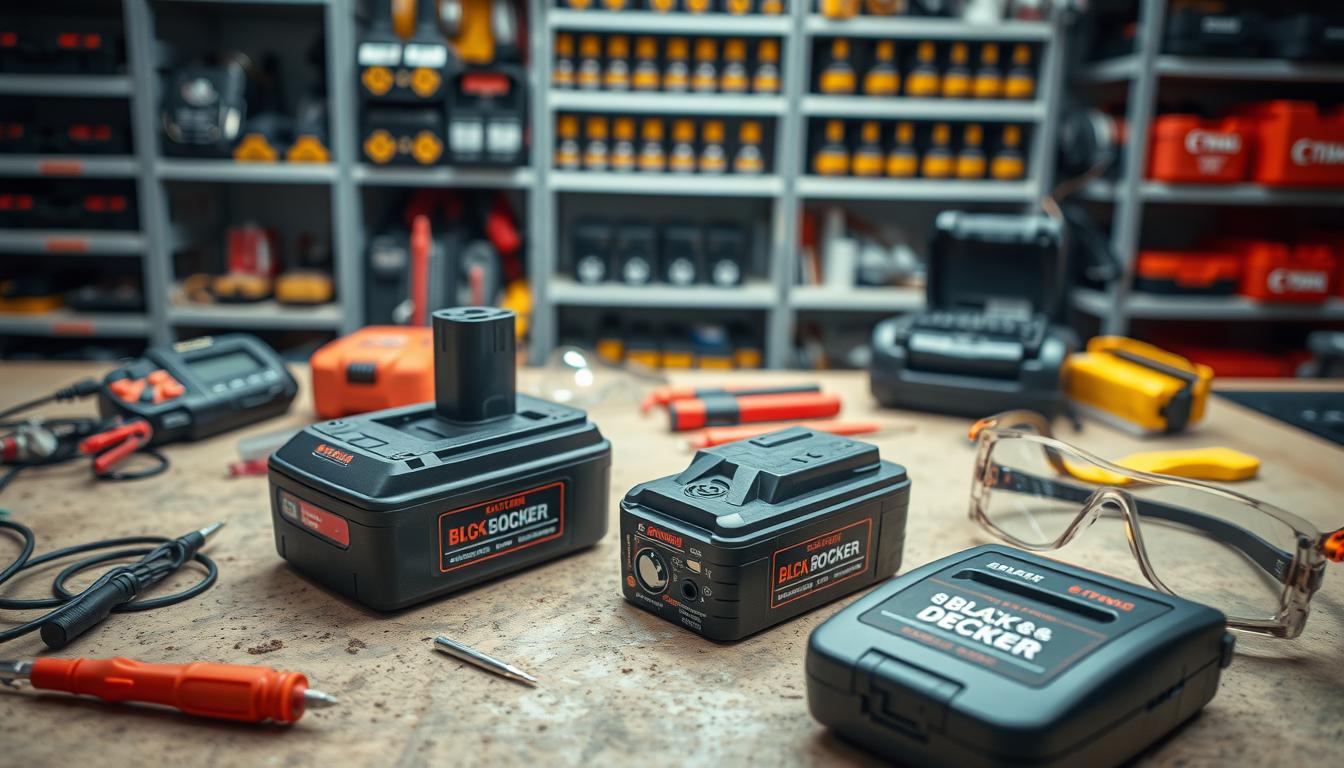Hybrid batteries usually last about 100,000 miles, but with the right care, you might stretch that to over 10 years. Factors like driving habits, temperature extremes, and battery quality play significant roles in their longevity. Innovations in battery technology are continuously improving these lifespans. Regular maintenance, including monitoring the State of Charge and ensuring cooling systems are clean, can prevent premature failures. Most manufacturers offer warranties covering eight years or 100,000 miles, providing added peace of mind. You'll find even more valuable insights into hybrid battery care and replacement options that can help you maximize your investment.
Key Takeaways
- Hybrid batteries generally last around 100,000 miles, with some lithium-ion batteries extending up to 200,000 miles.
- Proper care and maintenance can help extend battery life beyond 10 years.
- Driving habits and usage patterns significantly influence the replacement timeline for hybrid batteries.
- Extreme temperatures and frequent cycling can accelerate battery degradation and reduce overall longevity.
- Replacement costs typically range from $2,500 to $3,500, with warranties covering 8 years/100,000 miles for added protection.
Hybrid Battery Life Expectancy
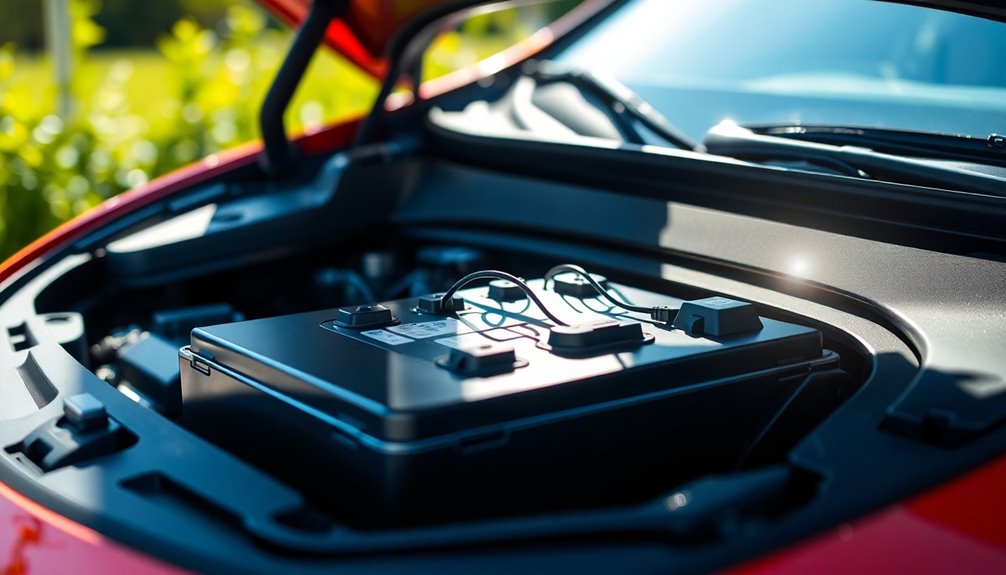
How long can you expect your hybrid battery to last? Typically, you can anticipate around 100,000 miles, with some lithium-ion batteries lasting up to 200,000 miles if you prioritize maintenance.
Most manufacturers back their hybrid batteries with warranties covering this mileage, reflecting their expected battery life. With proper care, you could enjoy your hybrid vehicle's battery for over a decade, depending on your usage patterns.
If you drive about 10,000 miles annually, your replacement timeline might differ from frequent drivers. Innovations in battery technology continue to improve longevity, so staying updated on maintenance practices can help maximize your hybrid battery's lifespan.
Invest time in care to guarantee your vehicle's battery remains efficient as long as possible.
Factors Affecting Battery Longevity
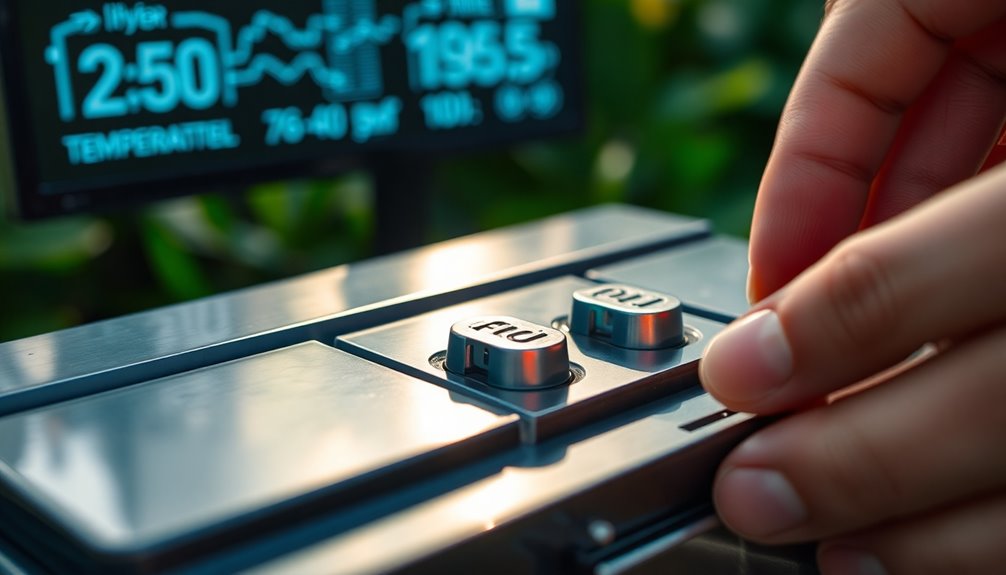
While you might expect your hybrid battery to last a significant amount of time, various factors can influence its longevity. The quality of the battery packs and their lithium-ion batteries plays a vital role.
Frequent cycling, or regular charging and discharging, can lead to aging materials and reduce battery capacity over time. It's important to monitor the State of Charge (SOC) and State of Health (SOH), as discharging below 70% can drastically diminish power.
Operating conditions also matter; extreme temperatures can cause premature failures if not managed properly.
Regular maintenance, like cleaning battery cooling fans and timely inspections, can help prevent overheating and extend the overall life of your hybrid battery, ensuring you get the most out of your investment.
Understanding Hybrid Battery Technology

When you think about hybrid battery technology, it's important to contemplate the composition and structure of the batteries you rely on.
Factors like the type of materials used and how often you use them can greatly influence their lifespan.
Understanding these elements helps you make informed decisions about maintaining and optimizing your hybrid battery's performance.
Battery Composition and Structure
Understanding the composition and structure of hybrid batteries is essential for grasping how they power modern vehicles. Typically, a hybrid battery pack consists of lithium-ion or nickel-metal hydride cells.
For instance, a Toyota Prius has 128 individual cells connected in series, generating a nominal voltage of 201.6 volts. Each cell usually operates at 1.2 volts, and their arrangement allows for higher voltage outputs necessary for hybrid vehicles.
The performance of these battery packs hinges on the equal charging and discharging of individual cells, monitored by battery control modules to prevent imbalances. If manufacturing defects occur or environmental conditions are extreme, the battery can fail prematurely, highlighting the need for quality control and proper maintenance.
Lifespan Influencing Factors
The lifespan of hybrid batteries is considerably influenced by several factors, including usage patterns and maintenance habits. Typically, these batteries last anywhere from 5 to over 10 years, but to maximize their lifespan, consider the following:
- Usage frequency: Frequent driving helps maintain battery health.
- Charging habits: Avoid deep discharges to prevent degradation.
- Maintenance practices: Regularly check the State of Health (SOH) and guarantee balanced charging.
- Mileage: Drivers averaging 10,000 miles annually may need replacement around the 5-year mark. Additionally, understanding RMDs and tax implications can help in planning for the financial aspects of battery replacement when it becomes necessary.
Common Causes of Battery Failure
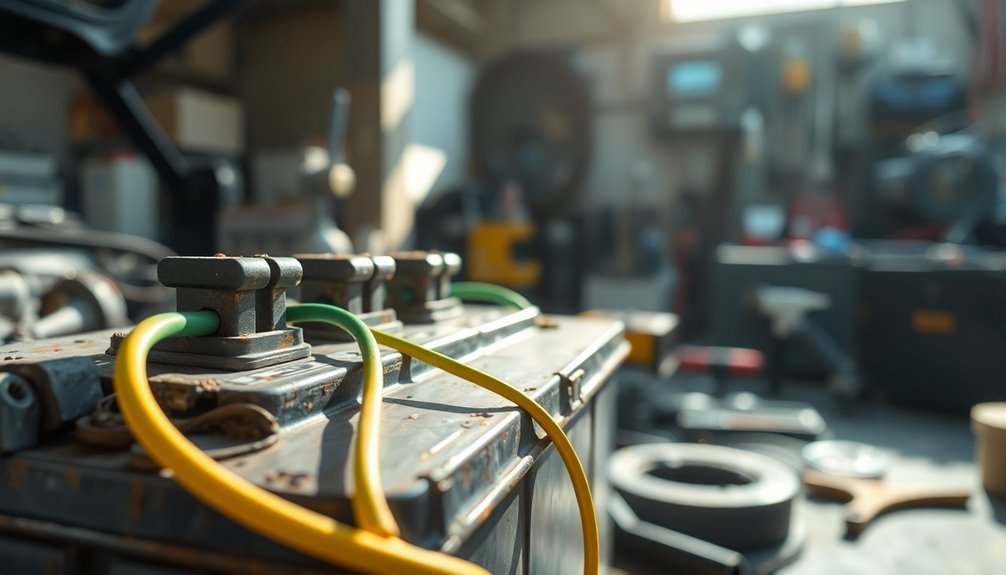
When it comes to hybrid battery failure, manufacturing defects and variability can play a significant role.
You mightn't realize that even minor inconsistencies in battery cells can lead to serious performance issues.
Additionally, extreme temperatures can further exacerbate these problems, affecting both lifespan and efficiency.
Manufacturing Defects and Variability
Although hybrid batteries are designed for longevity and efficiency, manufacturing defects can greatly undermine their performance and reliability.
These defects often stem from variability in the production process, leading to issues like:
- Inconsistent battery cell performance
- Imbalances within the battery pack
- Poor electrical connections during assembly
- Mechanical damage during maintenance
Such manufacturing defects can result in premature failure, considerably affecting your vehicle's reliability.
If there are flaws in the battery cells or connections, it can create failure points in the electrical system, reducing overall efficiency.
Being aware of these potential issues can help you make informed decisions when it comes to maintenance and battery replacement, ensuring your hybrid vehicle remains dependable for years to come.
Extreme Temperature Effects
Extreme temperatures can wreak havoc on hybrid batteries, greatly affecting their performance and lifespan. One major issue is that high temperatures can lead to thermal runaway, damaging battery cells and causing failure.
Conversely, low temperatures hinder the battery's ability to deliver power effectively. Your hybrid battery is designed to thrive within a specific temperature range, and prolonged exposure to extreme temperatures can result in permanent capacity loss.
The battery management system plays an essential role by monitoring cell temperatures to prevent overheating. However, a lack of maintenance, like neglecting the cooling fan, can exacerbate temperature problems.
To guarantee your battery lasts, regular maintenance is vital in combating the detrimental effects of extreme temperatures.
Maintenance Tips for Hybrid Batteries
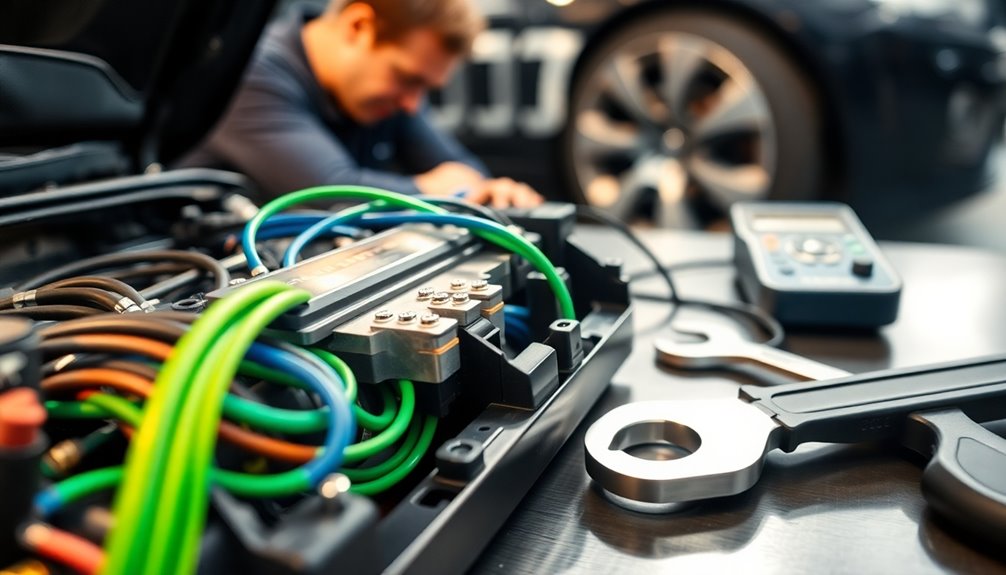
Maintaining your hybrid battery is essential for maximizing its lifespan and performance. Here are some effective maintenance tips for hybrid batteries that can help extend battery life and prevent issues:
- Clean the hybrid battery cooling fan and filter regularly to prevent overheating.
- Schedule semi-annual inspections to identify potential issues early and enhance battery performance.
- Monitor warning lights and trouble codes; addressing these promptly can prevent major failures.
- Guarantee equal charging and discharging loads among battery cells for peak performance.
Cost Considerations for Battery Replacement
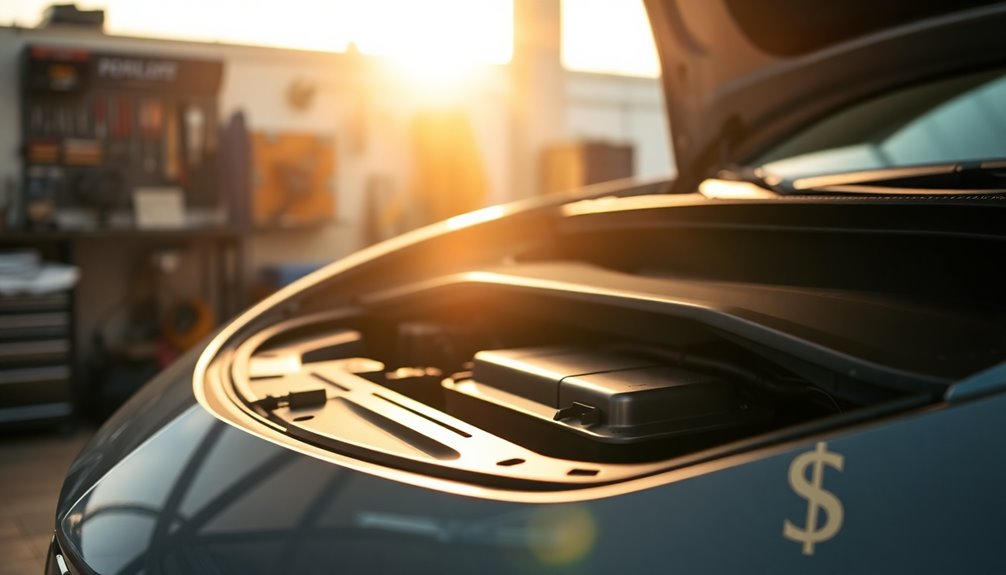
Taking care of your hybrid battery not only enhances its performance but also influences your wallet when it comes to replacement costs. Replacement costs can vary greatly, ranging from $2,500 to $3,500 for most hybrids, but larger vehicles might hit $6,000. It's essential to plan for battery replacement, especially as you approach the 100,000-mile mark. Regular maintenance can help you avoid premature failure and keep those costs down. Don't forget to check your warranty coverage; many hybrids offer about 8 years or 100,000 miles of protection, which can save you money. Fuel savings also help offset these expenses, making long-term ownership more manageable.
| Vehicle Type | Replacement Cost | Warranty Coverage |
|---|---|---|
| Small Models | $2,500 – $3,500 | 8 years/100,000 miles |
| Larger Models | Up to $6,000 | 8 years/100,000 miles |
| Maintenance | Lowers costs | – |
| Fuel Savings | Offsets costs | – |
| Replacement | Budget accordingly | – |
Frequently Asked Questions
How Long Do Hybrid Batteries Really Last?
When you ask how long hybrid batteries really last, you'll find the answer varies.
Generally, they last around 100,000 miles, but with proper maintenance, you could see them reaching up to 200,000 miles or more.
Typically, they last between 5 to over 10 years, depending on usage. If you drive frequently, you might need a replacement sooner.
Regular maintenance and inspections can greatly extend your battery's lifespan, potentially to 15 years or beyond.
Are Hybrids Reliable After 100K Miles?
Imagine you've got a well-maintained hybrid with 120,000 miles on it. You're wondering if it'll still be reliable.
Generally, hybrids can remain dependable after 100,000 miles, especially if they've received regular maintenance. Many owners find their vehicles continue to perform well for several more years.
If you guarantee the battery's in good shape and address any service needs promptly, your hybrid could serve you trouble-free for a long time yet.
Is There a Way to Check Hybrid Battery Life?
Yes, you can check your hybrid battery life using specialized diagnostic tools.
These tools assess individual cell performance and give you insights into the battery's overall health. Many hybrids have onboard diagnostic systems that alert you when something's off.
Regular maintenance checks and battery health assessments at automotive service centers can also help you estimate how much longer your battery might last.
Keeping an eye on these factors helps guarantee peak performance.
What Is the Life Expectancy of a Hybrid?
Did you know that some hybrid batteries can last over 300,000 miles with the right care?
Generally, you can expect a hybrid battery's life expectancy to be around 100,000 miles, but excellent maintenance might push that to 200,000 miles.
If you drive frequently, you might need a replacement closer to the five-year mark.
Keeping an eye on your battery's health can help you maximize its lifespan and performance.
Conclusion
In the end, knowing how long hybrid batteries last can save you both time and money. By understanding the factors that influence their longevity and taking proactive steps in maintenance, you'll not only extend your battery's life but also enhance your driving experience. After all, isn't it better to be prepared than to be caught off guard? Investing a little care now can lead to a smoother, greener ride down the road.


